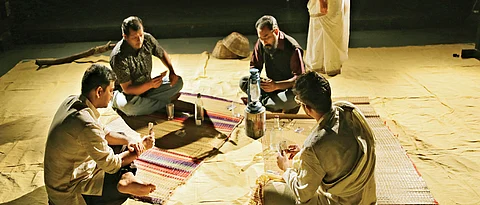

Badal Sircar’s play Pagla Ghoda, which focuses on deep-rooted patriarchy, will now be staged in Hindi by Maharashtra Cultural Centre. Sachin Joshi and Amrut Samak, co-directors, talk about the beauty of the text
It was in 1969, when Bengali dramatist and theatre director Badal Sircar wrote Pagla Ghoda (Mad Horse). One of the most translated Indian playwrights, the Hindi adaptation of the aforementioned play will be staged in the city by Maharashtra Cultural Centre on Thursday evening.
What makes this 48-year-old play relevant even now? Answer the co-directors of the play, Sachin Joshi and Amrut Samak, “There are a few lines in the play like this one — Ladki ka dosh yahi hai ki woh ladki hain. The play talked about deep-rooted patriarchy then. We might now like to call ourselves ‘progressive’, but we haven’t been able to shake off patriarchy completely. So the play is relevant even now.”
Adds Joshi, “It’s the beauty of text too. Sircar’s original Bengali text is extremely poignant. And so is the translated Hindi one. It’s an opportunity for us to step out of our comfort zone and perform in Hindi, instead of Marathi.”
To be staged in a ‘sandwich format’ — the audience will sit on either side, while the play will unfold in the middle section, the directors want it to be an intimate experience for the viewers. “The play is about four men sitting in a graveyard. So it already has four dimensions. And hence the performing area and the sitting area has been divided into four sections. Hopefully, this will lead to an intense sharing experience for the audience as well as the actors,” explains Joshi.
The plot
Pagla Ghoda revolves around the themes of regret, guilt and seeking redemption. It’s about four men and their relationships; “The four men meet in a graveyard, where they play cards and drink. And, then they get chatting about relationships, without actually accepting that it is their lives they are revealing. They try to maintain the mask, but deep within they know, they have wronged the woman,” says Samak.
“There is one man, who wears the badge of idealism, quite proudly. He expects his partner, to follow it as well. Another man gives preference to ‘brotherhood’ over his relationship with a woman and compels her to marry his friend. The third fellow throws a girl out of his life, because she drinks, and is the daughter of a rich man. He declines her proposal, saying ‘there is a big difference in the way we lead our lives. And, why should you change your life for me?’ But the true reason is that she drinks. And, when she dies in an accident, the guilt hits him. One man is a thekedar. He has saved a woman from ruffians, and, she worships him like a god. She takes care of his house. But since the thekedar has to keep travelling, he wants her to take up a job with another family. The girl says that she will travel with him, but the thekedar refuses to listen to her pleas. In all the four cases, the woman’s point of view is not considered,” adds Samak.
Her side of the story
“The way the play unfolds, the women who were wronged or treated unfairly, get a chance to express themselves. It’s not really a flashback mode, but with each man getting to relive his memories, the women speak out,” explains Joshi, who has also directed Pratibimb.
“An important facet of the play, is the ‘realisation’ that dawns on men — the realisation that they could have reacted or responded differently to the women,” says Samak, adding, “This feeling is quite strong. And, so is regret. But they don’t air either feelings openly. So their thought process is in a churn and chaos.”
Staging it in Hindi
Considering that the cast of actors is Marathi-speaking, how did they manage to polish their Hindi? “We have one actor from the Hindi belt, Ashish Tripathi. He is helping us with the pronunciations and intonations. We have been holding language workshops, before the rehearsals and in the performing area and even otherwise, we speak in Hindi. We have to convey our thought-process to the audience and that has to be done in the language of the play. It has to be believable enough, so we are taking extra efforts,” says Joshi.
“Also,” says Samak, “We hope to create a bunch of actors who can appreciate a new language, and its nuances.” With this play, they also plan to visit the Hindi belt and reach out to a bigger audience, and also perform at various festivals across the country.
ST Reader Service
Pagla Ghoda to be staged at Sudarshan Rangmanch, Shaniwar Peth on December 21, 7 pm. Tickets will be available one hour prior to the show
